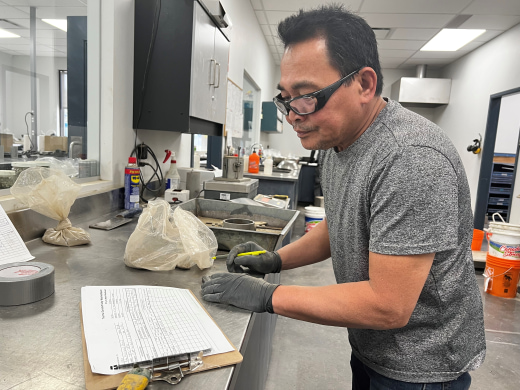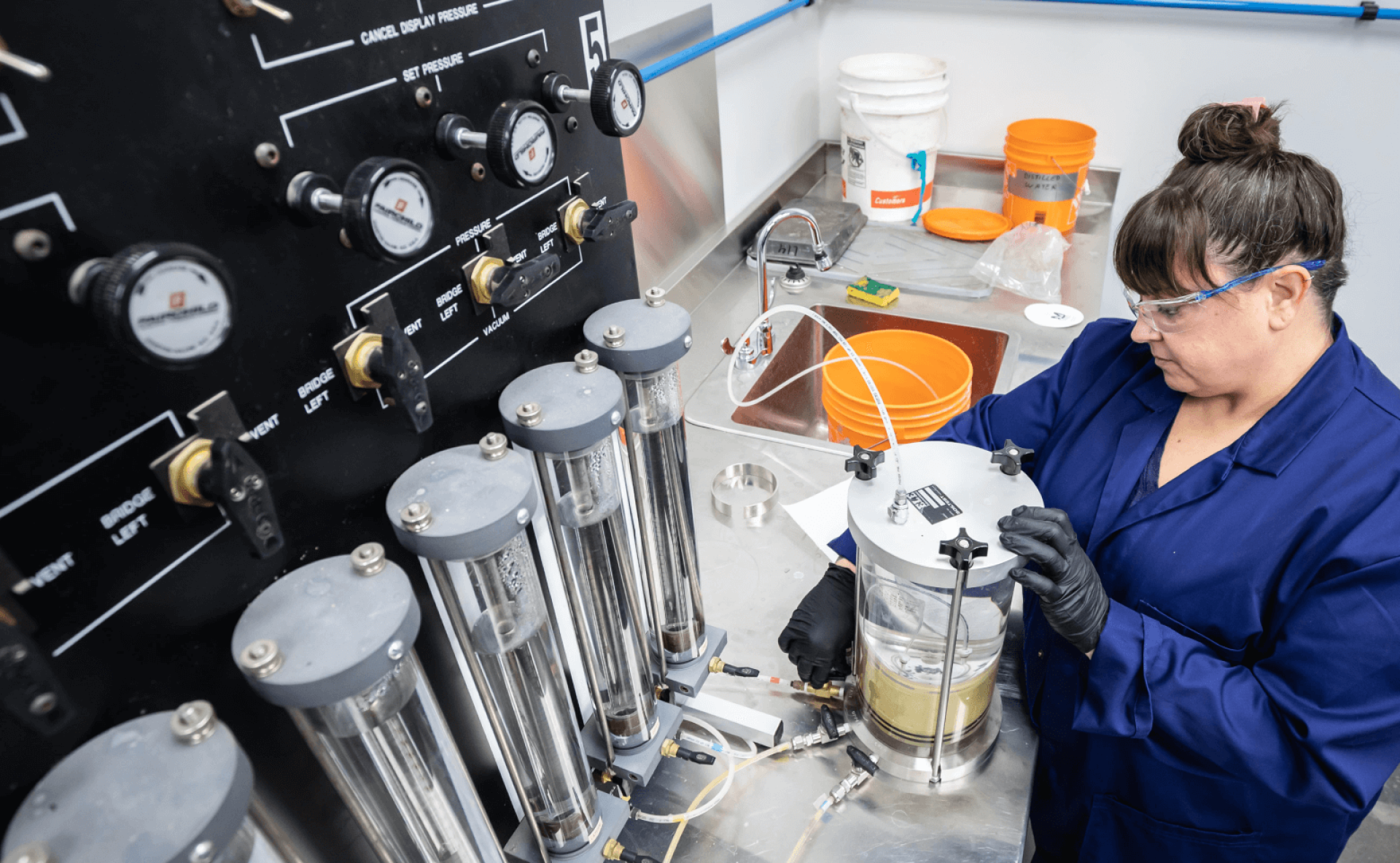Testing Soils and Materials
Whether you're building a roadway, a high-rise building, or a bridge, you need to know that the ground you're building on and the materials you're building with are stable, durable, and safe. Thurber offers advanced laboratory services in our offices across Canada. We test materials including soil, rock, aggregate, asphalt, concrete, and tailings. We are proud to be a member of the Canadian Council of Independent Laboratories.
Advanced Laboratory Services

A laboratory testing program is an integral part of all significant geotechnical investigations and construction materials QA/QC programs.
While standard index tests such as Atterberg limits and grain size distributions are performed for routine projects, the design of major structures requires more advanced testing of the soil and rock to determine strength and drainage properties.
Thurber provides timely and accurate advanced geotechnical and materials laboratory testing such as triaxial testing, direct shear testing, permeability testing, consolidation testing, and durability testing out of all our areas of operation.
The following advanced laboratory tests highlight some of our key lab services.
Strength tests
A suite of drained and undrained triaixial tests can be completed to assess the critical state of a cohesionless soil sample. This is used to support CPT interpretation of liquefaction susceptibility and understand the behaviour of loose sand/silt deposits. Specialty designed equipment allows for sample expansion during testing and post sample freezing for an accurate assessment of void ratio.
Determines the consolidated drained shear strength of a soil. Test conditions can include normal stress or stress in a moisture environment depending on the field conditions being investigated. Testing is done by forcing the soil to shear along an induced horizontal plane of weakness at a constant rate. Commonly used on projects involving landslide remediation, slope stabilization, and pipeline analysis.
Determines the consolidated peak and residual strength of a soil. The tests are conducted in a split box, where the bottom of the box is held stationary while the top of the box is sheared horizontally. After reaching the peak strength, the sample can be sheared back and forth to reach a residual strength. Tests are typically conducted in sets of three to assess the change in strength over a range of normal stresses. These tests are typically used when foundation weakness is expected along a thin zone, or limited sample is available for testing. This test is typically used in the design of embankments, foundations, pipelines, and landslide remediation.
Determines the undrained shear strength of cohesive soil, especially soft clays. The test can be conducted in-situ or in the laboratory. It is used for foundation design and landslide prediction.
Assesses the undrained strength of a rock or soil. Our equipment can also assess the axial strain during a test to estimate the Young’s modulus of a sample. The UCS test is commonly used in assessments of slope stability, foundations, embankments and in materials testing.
Assesses the strength of subgrade soils for pavement design of roads, highways, and runways.
Permeability tests
Determines the ability of a soil to transmit water. This information is crucial for designing dams, landfills, foundations, and retaining walls. This test also helps us model and manage groundwater resources and assess the permeability of materials such as concrete and asphalt. It is also used in the design of slurry cutoff walls.
Consolidation tests
Models the soil’s behaviour under various conditions to understand earthquake loading or soil stability. It provides insights into how soil structures and foundations respond to real-world conditions.
Measures the compressibility and settlement behaviour of soils under applied loads. This test helps us design foundations, select appropriate fill materials, and assess a slope’s stability. Also known as an oedometer test.
Measures the compressibility and hydraulic conductivity of high water content material. This test is used in tailings investigations to understand how quickly and by how much a slurry sample settles. The information obtained is used when designing tailings storage facilities.
Other specialized tests
Determines the hydraulic and mechanical behaviour of unsaturated soils. It is used to predict soil water storage and understand the amount soil will change as it dries out. This device is used to understand the behaviour of tailings materials.
Measures the thermal conductivity of soils and soft rocks. This test is used to estimate the thermal properties for heat dissipation around backfilled power cables and provide thermal analysis of frozen ground.
Determines the average resistivity of soil samples removed from the ground. This test is used in the assessment and control of corrosion in buried structures. This test can be conducted in the lab or in the field.


